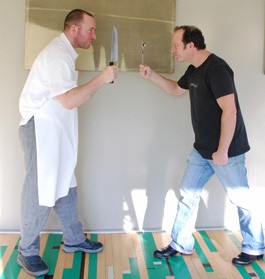Photograph by Alma Shaw
Spoonbar
The first thing I notice are the bikes lined up outside—white cruisers, shiny and retro, parked right across from a giant fountain tinkling with 2,000 stainless steel espresso spoons. Spoonbar already has my attention.
Attached to the new h2hotel in downtown Healdsburg, the restaurant Spoonbar is reminiscent of the way people in the ’60s imagined the future, where visionary eco-consciousness meets spacious artistic minimalism. The buildings are green—LEED certified, solar-paneled, many-windowed. The bikes are available to hotel guests, who are encouraged to pedal the town, and the spoon fountain uses rainwater collected on the roof. Spoonbar’s tables, bars and chandeliers are made from reclaimed woods (black acacia and elm) that warm and soften the exposed cinder-block-chic walls. As far as carbon footprints go, Spoonbar is treading lightly.
Even the unisex bathroom—the first I’ve ever encountered—has low-water flushes and white washcloths in lieu of paper towels. Cool jazz pairs well with my locally sourced Moroccan chicken (the signature dish) that’s taken three days to prepare.
Yep, there certainly are echoes of Michael Pollan’s Omnivore’s Dilemma. But when I ask chef Rudy Mihal about it, he just shrugs and talks about Sicily. “I spent a few years apprenticing in Italy and France,” he tells me, “where you have no choice but to use locally produced food.” In Sicily, he met his sea bass and octopus live, straight out of the sea, and cooking with the freshest ingredients translated into an ethos born of necessity and practicality. Mihal ticks off a list of local farms, including Gleason Ranch and County Line Harvest in Petaluma, where he procures the majority of his kitchen’s food.
A firm believer in hands-on learning, Mihal has been cooking full-time for 20 years, since he was 17. Not only did he eschew culinary school, he never graduated from high school. “Why bother?” he smiles. “I knew exactly what I wanted to do.”
Though he was sauting calf’s brains in New York City back in his 20s, Mihal’s Spoonbar menu is a “people pleaser,” with familiar fare like steak frites, crispy rock shrimp and the Spoonbar burger, a towering bacon and caramelized-onion-laden affair served on a perfectly toasted black sesame bun.
But at Spoonbar, Mihal’s not the only one rocking it old-school. “Mixologist” Scott Beattie might preside over the striking bar, but he does much more than merely tend it. By crafting classic recipes with the finest of ingredients—the Geisha calls for St. Germain Elderflower liqueur—he is resurrecting the lost practice of 19th-century cocktail artistry. “Thanks to Prohibition, the art of the cocktail plummeted,” he explains, “because people just wanted something palatable to get them drunk.” A far cry from those bathtub gin and tonics, Beattie uses fresh local citrus juices and quality microdistillery spirits to make artisanal “potions” almost too pretty to drink.
But for Beattie, cocktails are as scientific as they are artistic—he measures everything down to the ounce. In his book Artisanal Cocktails, Beattie betrays a startling array of specific knowledge, right down to what kind of ice cube trays (silicon) to use in order to keep your drink colder longer. Little wonder that even harsh critic Anthony Bourdain, who invited Beattie to appear on his show, had to begrudgingly admit that he enjoyed the mixologist’s concoctions.
As we sit at the long wood bar, with the cantina doors flung open to the sunny sidewalk bustle, Beattie laughingly admits that he spent “about three months drinking” in order to create Spoonbar’s cocktail menu, which is actually known as the “manifesto” among waitstaff. The thick, silver-bound book is as much an education as it is a menu. In it, Beattie explains why they don’t have much vodka to offer (consumers pay for the packaging, he argues, not the quality) and how Maker’s Mark is leading the pack in “greener” whiskey production.
In keeping with their green philosophy, Spoonbar’s “Give Us Your Fruit!” promotion, starting Feb. 16, invites locals to bring in their homegrown citrus overflow in exchange for dining credit. For Restaurant Week, the menu includes Gleason Ranch brick chicken, smoked bacon pork terrine, pan-seared California sea bass, Kobe beef short ribs, handmade potato gnocchi, flourless chocolate torte and more. Save room, of course, for cocktails.
Spoonbar Restaurant at the h2hotel, 219 Healdsburg Ave., Healdsburg. 707.432.7222.








